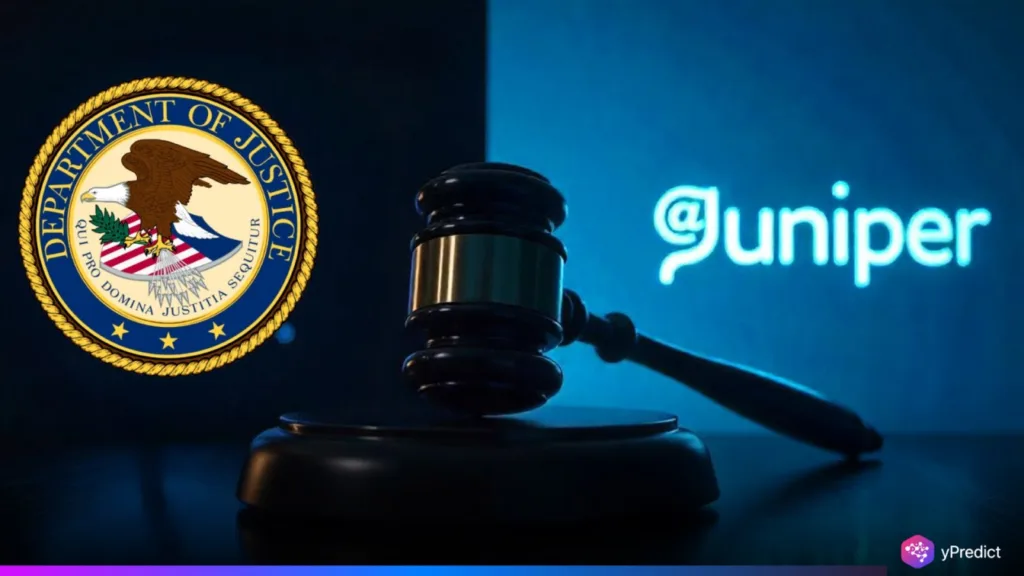
The U.S. Department of Justice reached a settlement with Hewlett-Packard Enterprise over its $14 billion acquisition of Juniper Networks. Announced on Friday, the agreement requires HPE to divest certain assets and follow measures that protect competition in cloud networking and cybersecurity. This resolution clears the way for HPE’s largest acquisition to date and highlights growing regulatory scrutiny of major tech mergers. It also reflects heightened oversight in the U.S. tech and telecommunications sectors as authorities monitor market concentration more closely.
DOJ Settles Antitrust Dispute With HPE
The U.S. Department of Justice (DOJ) reached a settlement with Hewlett-Packard Enterprise (HPE) regarding its $14 billion all-cash acquisition of Juniper Networks. The agreement, disclosed in late June through federal court filings in California, comes after the DOJ’s earlier move to block the merger over concerns it would significantly reduce competition in the enterprise networking market. The news was announced in a press release, which stated that,
Hewlett Packard Enterprise (NYSE: HPE) and Juniper Networks, Inc. (NYSE: JNPR) today announced they have reached an agreement with the U.S. Department of Justice (“DOJ”) that, subject to court approval, resolves the DOJ’s lawsuit challenging HPE’s acquisition of Juniper and clears the way for the transaction to close.
Under the proposed terms, HPE must divest its global “Instant On” wireless networking segment, including IP, R&D staff, and client ties. The combined entity must also license the source code behind Juniper’s Mist AI software, critical to its WLAN product line. The DOJ mandated an auction process to ensure this licensing arrangement promotes fair competition and broad market access.
The settlement still requires judicial approval, but would cancel the trial previously scheduled to begin on July 9 in San Jose. The DOJ expressed satisfaction, stating that the proposed divestitures and licensing terms will preserve competition in enterprise-grade WLAN technologies.
Regulatory Pushback and Corporate Rebuttals
In January 2025, the DOJ filed a lawsuit to block the merger, warning it would reduce competition in networking infrastructure. The agency argued the market would shrink from three major players—HPE, Juniper, and Cisco—to two, with HPE and Cisco dominating. Prosecutors cited internal HPE documents that outlined plans to counter Juniper’s Mist platform and flagged risks to innovation and choice.
Juniper rejected the DOJ’s claims, arguing in February that regulators misrepresented market conditions and ignored how customer needs influence network purchases. HPE also defended the deal, saying it was intended to boost AI capabilities, not limit competition.
Company executives, including HPE CEO Antonio Neri, consistently defended the deal as a strategy to advance AI-native network solutions. Neri emphasised that the merger would deliver a secure, end-to-end networking architecture designed for AI-powered data centres and cloud operations.
Deal Implications and Strategic Outlook
In a public statement after the settlement, Hewlett-Packard Enterprise confirmed the agreement removes a key regulatory hurdle and advances the transaction. Although HPE provided no closing timeline, Neri reaffirmed the merger’s benefits for customers and shareholders alike. He promised access to a stronger, more competitive portfolio of AI-enabled networking tools across cloud and enterprise environments. He said in the press release that…
Our agreement with the DOJ paves the way to close HPE’s acquisition of Juniper Networks and preserves the intended benefits of this deal for our customers and shareholders, while creating greater competition in the global networking market. For the first time, customers will now have a modern network architecture alternative that can best support the demands of AI workloads…
The DOJ hailed the settlement as a reaffirmation of its commitment to safeguarding competition in tech markets. While the resolution clears a key hurdle for HPE, the company still faces headwinds, including a planned 5% workforce reduction through fiscal 2025 and 2026. Nevertheless, HPE remains optimistic, hinting at a major AI-related deal expected later this year.





